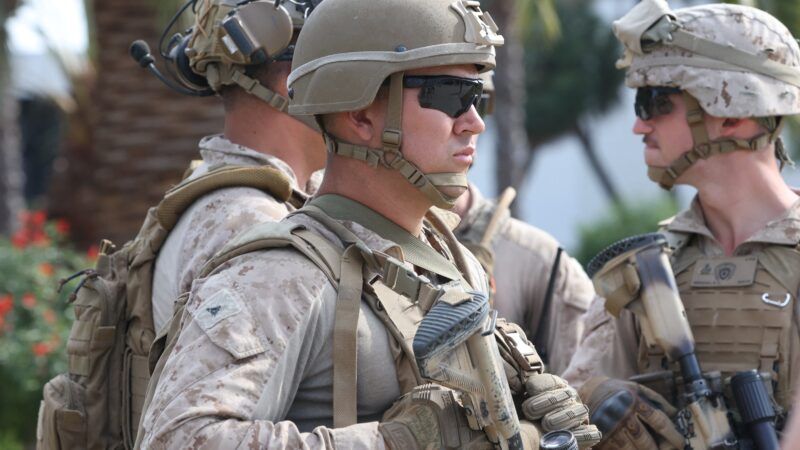The Ninth Circuit's Flawed Decision Upholding Trump's Federalization of the California National Guard
The ruling gets several important issues right - and one big one wrong.


Yesterday, the US Court of Appeals for the Ninth Circuit issued a decision overturning a trial court ruling that had invalidated President Trump's federalization of 4000 troops of the California National Guard. The Ninth Circuit gets several important issues right, but ends up getting the bottom line wrong.
Trump federalized the National Guard in response to protests and unrest caused by ICE deportation operations. The statute Trump relied on, 10 U.S.C. Section 12406, can only be used to federalize state forces in one of the following situations:
1) the United States, or any of the Commonwealths or possessions, is invaded or is in danger of invasion by a foreign nation;
(2) there is a rebellion or danger of a rebellion against the authority of the Government of the United States; or
(3) the President is unable with the regular forces to execute the laws of the United States
All parties agree there is no "invasion" by a foreign power. District Court Judge Charles Breyer correctly ruled the very limited violence in LA was nowhere near the type or scale needed to qualify as a "rebellion," and also that mere impediments to law enforcement don't qualify as an "inability" to "execute the laws" with "regular forces." Otherwise, as I pointed out in my analysis of his ruling, an "inability" to enforce the laws would exist in virtually every city at any time, since there are always many lawbreakers whom "regular forces" are unable to detect and detain. Judge Breyer also ruled, correctly, that the determination about whether the prerequisites for invoking the statute exist is not a "political question" exempt from judicial review.
Interestingly, the per curiam Ninth Circuit ruling actually endorses much of the above. Like Judge Breyer, the appellate court rejects the administration's position that the criteria for invocation are a political question immune from judicial review. Indeed, the Ninth Circuit actually goes further than Breyer, concluding that the political questions doctrine doesn't apply to statutory issues at all, only certain constitutional ones. I am not sure this is correct, as a general matter. But I do agree that the president does not have unconstrained authority to invoke extraordinary emergency powers purely based on his say-so.
The Ninth Circuit does not address whether there is a "rebellion" in Los Angeles, basing their ruling purely on the supposed "inability" to execute federal law with "regular forces." On that score, they, much like Judge Breyer, recognize that this provision is only triggered by extreme situations:
[W]e do not think that any minimal interference with the execution of laws is, by itself, enough to justify invoking § 12406(3). The statutory context confirms that. Subsections one and two of the statute discuss unusual and extreme exigencies—invasions and rebellions—that threaten the normal operations of civil government. If we were to adopt the federal government's reading of subsection three, it would swallow subsections one and two, because any invasion or rebellion renders the President unable to exercise some federal laws.
As Judge Breyer explained in his detailed opinion, there was no such "unusual and extreme exigency" in LA on June 7. ICE and other federal law enforcement agencies continued to operate - including by detaining numerous supposedly illegal migrants - despite a few violent incidents in which no one was killed or even - apparently - seriously injured.
The Ninth Circuit also emphasizes that the courts can overturn invocations of the act made in "bad faith" for pretextual reasons.
The evidence the Ninth Circuit cites as justifying federalization seems skimpy, at best:
There is evidence that the day before, protesters threw objects at ICE vehicles trying to complete a law enforcement operation, "pinned down" several FPS officers defending federal property by throwing "concrete chunks, bottles of liquid, and other objects," and used "large rolling commercial dumpsters as a battering ram" in an attempt to breach the parking garage of a federal building. Plaintiffs' own submissions state that some protesters threw objects, including Molotov cocktails, and vandalized property. According to the declarations submitted by Defendants, those activities significantly impeded the ability of federal officers to execute the laws.
Such actions are reprehensible and should be prosecuted in court. But they fall far short of an "unusual and extreme exigency."As Elizabeth Goitein, a leading expert on presidential emergency powers and the domestic use of the military, points out, "[t]he [govenment's] declarations do not provide a single example of a case in which an attempted ICE raid was thwarted or a planned raid was canceled."
Moreover, allowing these kinds of low-level violence and impediments to law enforcement to justify invocation Section 10,246 violates the Ninth Circuit's own strictures against interpreting Subsection 10,246(3) so broadly as to "swallow subsections one and two." Virtually Any invasion or rebellion necessarily involves much greater violence than this, and much greater consequent interference with federal law enforcement. The only way to avoid the redundancy is to limit Subsection 3 to large-scale civil disorder that does not amount to a "rebellion" or "invasion," but does cause a major breakdown in law enforcement. By contrast, some invasions and rebellions, because of their short duration or limited geographic focus (e.g. - the enemy invades a very lightly populated area where there is relatively little crime), may create only modest obstacles to law enforcement, and those come under one of the first two subsections without triggering the third.
Why, then, does the Ninth Circuit rule in favor of Trump? Largely because they apply "a highly deferential standard of review" to presidential determinations here. The court admits that "the text of the statute does not make the President the sole judge of
whether one or more of the statutory preconditions exist," and that "if we were considering the text of § 12406 alone, we might conclude that the President's determination is subject to review like certain other factual findings that are preconditions for executive action under a statute." They nonetheless opt for broad deference because "a line of cases beginning with Martin v. Mott, 25 U.S. (12 Wheat.) 19 (1827), interpreting those delegations, strongly suggest that our review of the President's determinations in this context is especially deferential."
Martin was an 1827 case interpreting a predecessor statute to Section 12406, in which the Supreme Court held that "the authority to decide whether the exigency has arisen, belongs exclusively to the President, and that his decision is conclusive upon all other persons." This strikes me as terrible reasoning, essentially allowing the president to assert extraordinary emergency powers based on his unsupported say-so. If he truly has unreviewable authority to determine whether the relevant "exigency" exists, he could declare that, e.g., illegal marijuana possession qualifies as "rebellion" (or as an inability to enforce the laws with regular forces, so long as many violators aren't caught), and federalize the Guard throughout the nation, indefinitely.
If Martin were a binding precedent indistiguishable from the present case, the Ninth Circuit would have to apply it. But the Ninth Circuit judges themselves note multiple plausible reasons to make distinctions. Among other things, Martin 1) addressed a predecessor statute enacted many decades earlier (Section 10246 was enacted in 1903), 2) it dealt with an obvious genuine "invasion" - the War of 1812, 3) "the Court relied in part on the nature of a foreign invasion and the need for military subordinates to follow orders" [Martin involved a case of a New York militiamen who refused orders to help repel British attacks during the War of 1812], and 4) recent precedents, including the Supreme Court's own approach to similar language in the Alien Enemies Act (authorizing detention and expulsion of non-citizens in the event of "invasion"), are far less deferential. Even if none of these points is individually sufficient to justify reading Martin narrowly, they are surely enough in combination.
In addition, the Ninth Circuit should have paid greater heed to its own stricture that deference should not be applied to presidential determinations made in "bad faith." There is considerable evidence of such bad faith here. Trump has a long history of advocating the use of the military against political opponents, and generally praising political violence against them. More recently, high-ranking administration officials have openly stated that the goal of deploying the military in LA is to usurp the authority of the state and local governments. For example, DHS Secretary Kristi Noem has said that "[w]e are staying here to liberate this city from the socialist and burdensome leadership that this governor and this mayor have placed into this city."
At the very least, if courts (wrongly) reject other reasons for invalidating Trump's federalization of the Guard, they should closely investigate the evidence of bad faith here, instead of just presuming good faith, as the Ninth Circuit judges did. Bad faith, even if present, might not by itself justify striking down the President's actions. Sometimes government officials do the right thing (or at least the legal thing) for the wrong reason. But extensive evidence of bad faith is sufficient reason to deny deference that might otherwise be appropriate.
Finally, I think the Ninth Circuit flubbed the statutory requirement that "federalization orders must be issued "through the governor of the respective State … from which State … such troops may be called." The judges were wrong to conclude this requirement is met by issuing the orders to the state's Adjutant General, a subordinate official who is the commander of state military forces. It seems clear that "through the governor" means "through the governor," not through a subordinate of his. That said, there is legitimate dispute over whether that provision is purely ministerial or whether it requires the governor to consent to the orders.
Overall, the Ninth Circuit decision makes some good points, and gets several important issues right. Sadly, they then largely ruined their own good work by engaging in excessive deference.
As the decision notes, they do not address some important issues still before the trial court, most notably whether the president's use of the military in LA violates the Posse Comitatus Act (which bars the use of the military for civilian law enforcement in most circumstances).
More can be said. But this post is already too long, and I will stop here.
Elizabeth Goitein, mentioned above, has additional analysis and criticism of the Ninth Circuit ruling in an insightful Twitter/X thread.
